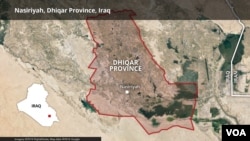United Nations human rights officials are condemning what they call the shocking and appalling mass executions of 38 men in Iraq on Thursday. The men, who were executed at a prison in the southern Iraqi city of Nasiriyah, were convicted for terrorism-related crimes.
A spokeswoman for the U.N. High Commissioner for Human Rights, Liz Throssell, told VOA her office did not learn of the mass executions until after the fact.
"That again just underscores the situation, that suddenly we get sort of word, we get news that there has been a mass execution," Throssell said. "That goes back to the lack of transparency, the lack of information regarding what is happening to these people."
Throssell said that since 2015, the U.N.'s office in Iraq repeatedly has asked the Iraqi minister of justice for information regarding the many men on death row, but with little response. She said no concrete figures are available, although about 1,200 men are believed to be awaiting execution.
She noted the Iraqi justice system is very flawed and it is extremely doubtful that the 38 men who were executed had received a fair trial.
"This raises the prospect of irreversible miscarriages of justice and violations of the right to life," Throssell said. "The imposition of the death sentence upon the conclusion of a trial in which fair trial provisions have not been respected constitute a violation of the right to life."
Throssell said there is a disturbing pattern of mass executions in Iraq. She notes about 106 executions have taken place this year, including 42 mass hangings of prisoners in a single day in September. The Reuters news agency cites the Justice Ministry as saying all those convicted were members of Islamic State.
Iraqi Prime Minister Haider al-Abadi announced several days ago that the three-year war aimed at driving IS out of Iraq was successful and had come to an end.
The high commissioner is calling for a halt to all executions and a moratorium on the use of the death penalty in Iraq.




